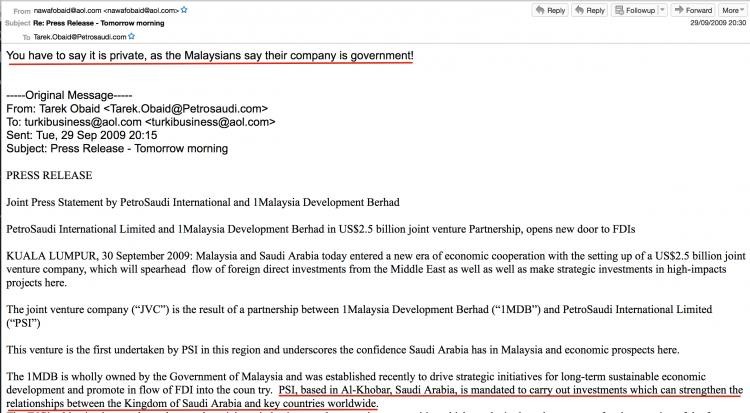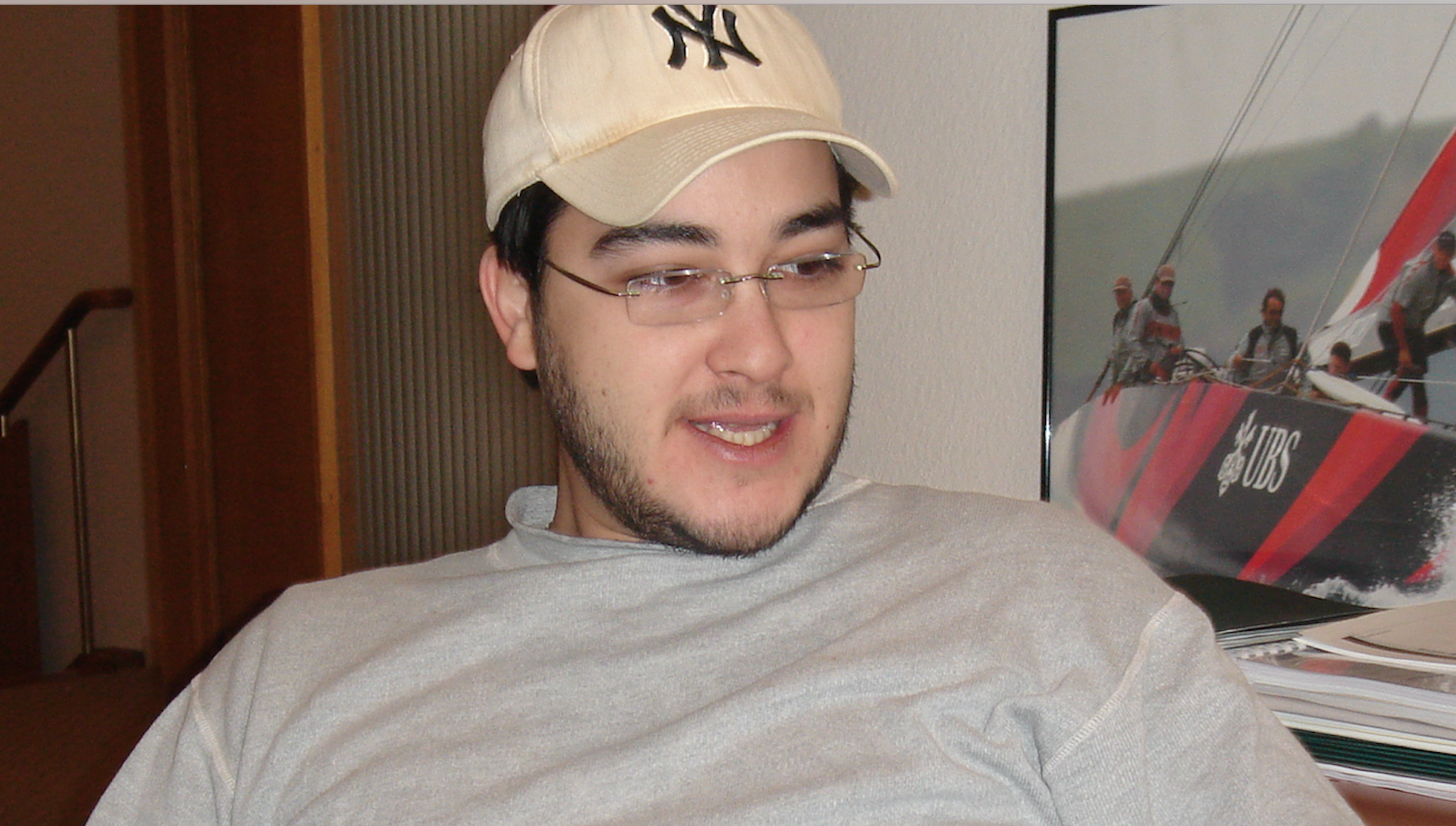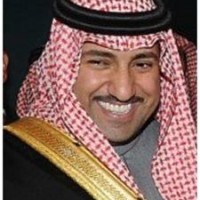
Sarawak Report has learnt that Saudi Arabia has added to the list of countries taking an interest in investigating 1MDB, after the Saudi national and shareholder/director of PetroSaudi International, Tarek Obaid, was pulled in for questioning in recent days.
This will surprise those who have expressed the opinion that certain well-connected people related to 1MDB are ‘above the law’ in Saudi, as has appeared to have been the case so far in Malaysia.
Saudi Arabia has been placed in a delicate position by this scandal, ever since the Malaysian Prime Minister chose to claim that the $681 million and other sums which entered his accounts, were a ‘donation’ from an anonymous Saudi Royal.
One BBC report and a UK Telegraph article had indicated that (according to their sources) the ‘donor’ was Prince Turki a seventh son of the previous King Abdullah and co-founder of PetroSaudi.
The country’s Foreign Minister Adel Al-Jubeir had originally given his opinion that this was unlikely to be the case. However, subsequently, during a diplomatic meeting and accompanied by the Malaysian Foreign Minister he told a Malaysian TV team that he now understood the donation to be true:
“We are aware of the donation and it is a genuine donation with nothing expected in return. We are also fully aware that the attorney-general of Malaysia has thoroughly investigated the matter and found no wrongdoing. So, as far as we are concerned, the matter is closed,”
Nevertheless, a recent US Department of Justice indictment has confirmed the longstanding suspicion that the money in fact originated from 1MDB.
PetroSaudi’s “story” – claimed official state backing for ‘Royal’ company
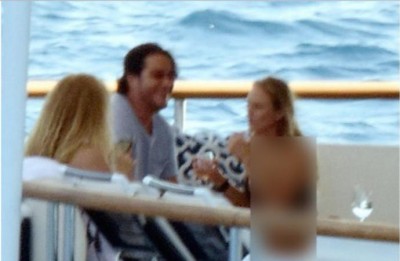
The Saudi incorporated company PetroSaudi has, of course, played a crucial role in the diversion of much of 1MDB’s missing cash, according to the evidence.
The DOJ referred heavily to the company’s active role, during what it calls the first “Good Star Phase” of the scheme to use 1MDB to steal billions of Malaysia’s public money.
In return for a massive injection of over $300 million into the $100,000 dollar company and also kickbacks sent by Jho Low to Tarek Obaid (initially $105 million), PetroSaudi agreed to ‘act as a front’ for the siphoning out of the rest of the $1.83 billion paid by 1MDB into their ‘joint venture project’. That money was sent to companies owned by Jho Low, principally Good Star Limited.
The DOJ indictment refers to Obaid (the CEO of PetroSaudi) as having deliberately lied to banks and officials from 1MDB by saying that Good Star belonged to PetroSaudi, thus providing a cover for the misappropriation of the cash by Najib Razak’s nominee Jho Low. In particular the court filing cites an example where Obaid signed a false statement, which assisted Jho Low in siphoning a sum of $330 million into his Good Star account, which had been meant for the joint venture:
“On or about May 12, 2011, the 1MDB-PetroSaudi JV issued to 1MDB a Notice of Drawing (the “Notice”). The Notice was signed by the PETROSAUDI CEO on behalf of the 1MDB-PetroSaudi JV and requested that 1MDB transmit $330 million to the Good Star Account.
Obaid ‘PetroSaudi CEO’ later asked for the money to be sent to Good Star, proving he knew it was not part of the joint venture to which the money was supposed to have been sent:
“On or about May 25, 2011, the PETROSAUDI CEO sent 1MDB a letter on behalf of PetroSaudi and the 1MDB-PetroSaudi JV. This letter confirmed that the account at RBS Coutts in Switzerland had received the $30 million and the $65 million wires referenced in the table above. However, the PETROSAUDI CEO requested that 1MDB send to RBS Coutts a “SWIFT CLARIFICATION” explaining that the beneficiary of these wire transfers was actually “Account No. XXX.2000” (the Good Star Account) and not “Petrosaudi International Limited.”
Separately, it has also been revealed that Tarek Obaid sent a letter in 2015 to 1MDB officials, in order to support their claim to investigators in Malaysia saying that Good Star was a subsidiary of PetroSaudi, clearly now proved a lie.
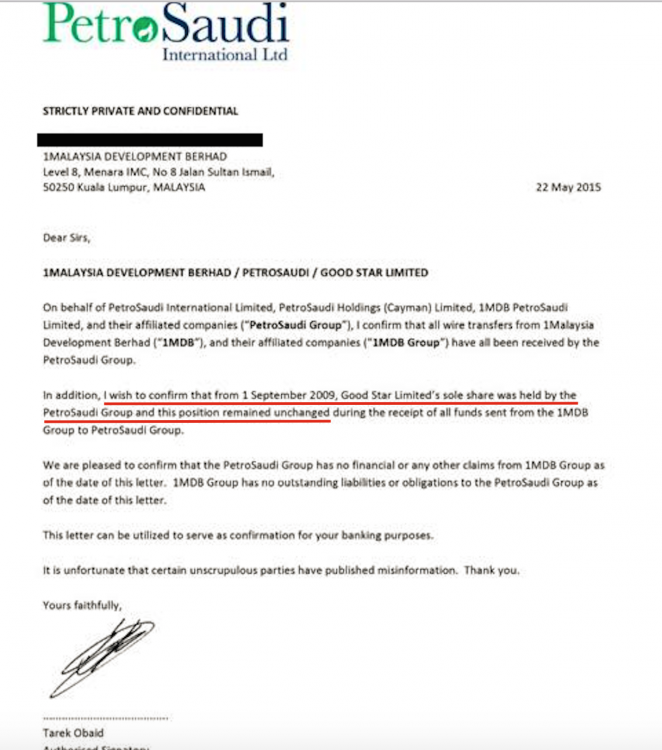
‘Quasi Sovereign’/ ‘Ultimately owned by King Abdullah’
As the Saudi authorities scrutinise this rogue behaviour by their own national, they might also be interested in understanding exactly how the directors of this ‘royally related’ company were peddling its connections on the global stage, presenting PetroSaudi as a “quasi official’ arm of the state.
Indeed, 1MDB Executive Director Casey Tang had informed his board that the company was “ultimately owned by King Abdullah”, which was a lie.
Sarawak Report has been examining documents and emails showing how PetroSaudi’s two key directors, Tarek Obaid and the British/Swiss national Patrick Mahony presented the company to prospective business partners, including former UK Prime Minister and then Middle East envoy Tony Blair.
According to a document they sent to several major companies called “PSI [PetroSaudi International] Story’ the company enjoyed unique and semi-official status, given that Obaid’s fellow shareholder was a son of then King Abdullah. “Governments have been very welcoming to PSI because they feel they are working with a quasi-sovereign entity (given that it is a vehicle of the Saudi Royal Family)”, the document explains:
“PSI’s aim is to approach nations with strong ties to Saudi Arabia and use the friendly relationship with these governments to give it access to oil and gas reserves. Governments have been very welcoming to PSI because they feel they are working with a quasi-sovereign entity (given that it is a vehicle of the Saudi Royal Family) and one that understands them. So PSI has had privileged access to many hydrocarbon regions in the world
The prospectus, which was written in 2009 goes on to brag how this tiny shell company, which as yet barely operated any oil concerns at all, could use the muscle of Saudi Arabia to protect its interests, thanks again to its ‘quasi sovereign’ role:
“…many countries will get a company in but then bully it around once it is there and has sunk billions of dollars in the ground. This will not happen with PSI because these nations do not want to get on the wrong side of the Saudi Royal Family or the Kingdom (many of these countries depend on Saudi aid, they are fellow Muslim nations, etc.). Therefore a partnership with PSI is also good protection on investments made in what can often be difficult operating environments…. Furthermore PSI has full support from the Kingdom’s diplomatic corps when entering and operating in these countries.”
Was the Saudi Arabian Government and the King aware that this seventh prince and his pals were promoting their company in such a way, boasting of guaranteed access and state support?
See the full document:
PetroSaudi International Ltd. (PSI) was founded by HRH Prince Turki bin Abdullah bin Abdulaziz al Saud (the son of King Abdullah, the current King of Saudi Arabia) and Tarek Essam Ahmad Obaid (from a prominent business family in KSA). PSI was set up to take advantage of the desire of many countries with oil and gas reserves not to hand over their resources to the big multinationals (Shell, BP, Exxon etc) and to work with governments or companies that they believe are more like-minded and not just trying to make large profits off of hydrocarbons they feel belong to them. Many of these countries do not have the money or technology to exploit their resources so they need to work with partners. Saudi Arabia is an obvious choice as it has both the capital and the significant expertise through its national oil company, Aramco (the largest oil company in the world). Unfortunately though Aramco’s mandate does not allow it to own upstream assets outside of the Kingdom. It can own downstream assets (for example, the refineries in China) but not upstream. As such, Prince Turki and Tarek saw an opportunity to bring Saudi capital and technology to nations that needed it to develop their hydrocarbon industry through a private vehicle, PetroSaudi International.
PSI’s aim is to approach nations with strong ties to Saudi Arabia and use the friendly relationship with these governments to give it access to oil and gas reserves. Governments have been very welcoming to PSI because they feel they are working with a quasi-sovereign entity (given that it is a vehicle of the Saudi Royal Family) and one that understands them. So PSI has had privileged access to many hydrocarbon regions in the world (the Caspian, Venezuela, Africa) and is currently acquiring assets in these regions. Unfortunately though the scale that PSI is reaching is rapidly becoming very large and the resources required are significant so PSI needs a partner that has a) the appetite for the oil and b) the capital, technical and human resources to help it progress and develop all of the assets it is accessing. PSI has already been approached by some of the majors and various NOC’s but, like the governments it is working with, PSI wants to work with a like-minded partner and one that understands the sensitivities around how PSI is leveraging off of the Kingdom’s relationships to gain access to these reserves. It is very important that any partner understands KSA well and also appreciates the reasons why PSI is allowed to operate in a given country.
So the opportunity to work with PSI is a pretty unique opportunity for an oil and gas company or an investor to partner with a vehicle that will grant it unrivalled access to many hydrocarbon regions of the world and can also protect any investment they make in these regions. This last point is important because (as has been seen with Shell in Nigeria, BP in Russia for example) many countries will get a company in but then bully it around once it is there and has sunk billions of dollars in the ground. This will not happen with PSI because these nations do not want to get on the wrong side of the Saudi Royal Family or the Kingdom (many of these countries depend on Saudi aid, they are fellow Muslim nations, etc.). Therefore a partnership with PSI is also good protection on investments made in what can often be difficult operating environments. The first point is important too because many of the companies PSI speaks to cannot even access some countries that PSI is already operating in. Furthermore PSI has full support from the Kingdom’s diplomatic corps when entering and operating in these countries.
With such a pitch it is easy to see why the tiny company appeared to be the ideal front for the scammers managing 1MDB, in particular Jho Low, who sought to present their deal as a ‘state to state’ venture between Malaysia and Saudi Arabia.
PetroSaudi sent Jho Low the story pitch shortly after they agreed to partner in early September 2009.

Likewise, time and again the directors of PetroSaudi made in plain in their dealings with other companies that their primary asset was supposed ‘unique access’ and guaranteed backing from the crown and state of Saudi Arabia.
Leveraging Royal connections – ‘Access Capitalism’
This was how directors explained their company’s role to China’s Sinochem for a JV proposal in 2009:
“PSI shall be responsible for … leveraging the royal and political connections of the Kingdom of Saudi Arabia available to PSI to obtain privileged access to O&G Projects in certain regions in the world…. PSI shall continue to leverage the above mentioned connections to closely manage the politics of the projects to facilitate their smooth operations…”.
And again in July 2010 to the team of Tony Blair, who agreed to become a consultant to PSI, seeking out investors and business partners, in return for $65,000 a month (and a 2% success fee), To Tony Blair Associates PSI explained that the attraction for business partners was the opportunity “to leverage off of the shareholders of PSI’s contacts to access government contracts in infrastructure and other areas in the Kingdom“
The fact that PSI was making such claims of unique access and guarantees might come as a surprise to Government and Royal officials in Saudi Arabia. They certainly didn’t want to broadcast what they were up to – the ‘PSI Story” insisted that their prospective partners needed to “understand the sensitivities around how PSI is leveraging off of the Kingdom’s relationships“.
Yet. in a pitch for investors into Venezuela in December 2009 they elaborated further on their business model:
“PSI can capitalise on the political connections of the Kingdom of Saudi Arabia to get advantaged access and provide the necessary drilling services…. Venezuela will have “support” from the most important oil producer in the world – KSA.” PSI explained in a power point presentation.
Don’t say Government to Government!
Sarawak Report has already reported the extent to which PetroSaudi were deeply nervous of making any such claims in public.
Najib had attempting to make full use of the supposed official connections of PetroSaudi when he was announcing the so-called Joint Venture with 1MDB in 2009 and insisted on the involvement of Prince Turki being included in publicity. However, Tarek’s brother Nawaf (an official with a job in the Saudi Government) anxiously warned that the press statements must remove any reference to the venture being ‘Government to Government’ in the press releases.
“You have to say it is private” cautioned Nawaf, “as the Malaysians say their company is government!”
Tarek took his brother’s hint he added three words (in bold) to the draft press release
“PSI, based in Al-Khobar, Saudi Arabia, is a private company mandated to carry out investments which can strengthen the relationships between the Kingdom of Saudi Arabia and key countries worldwide.”
Meanwhile, Mahony had expressed hope that the international press would not pick up at all on the PetroSaudi 1MDB joint venture announcement, plainly because it would raise eyebrows that such a tiny company had landed such a big deal amid so much fanfare raised by Najib regarding country to country relations between Malaysia and Saudi Arabia.
Now officials back home are fully aware of the game being played by Obaid and his PetroSaudi colleagues, as they attempted to exploit their shareholder Prince to raise billions of investment on the promise of ‘access’ in Saudi Arabia. What action they take remains to be seen.
